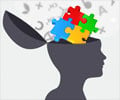People with obsessive-compulsive disorder (OCD) may respond to emotions related to distress differently when compared to their unaffected siblings.

‘After viewing OCD-related images, patients with OCD had increased distress and higher levels of activity in emotion-related brain regions compared to their unaffected siblings.’





The distinction is crucial for efforts to identify people at risk for OCD--a disorder that has strong genetic influences. Although difficulty with emotion regulation is thought to contribute to OCD, the findings indicate that brain activity patterns associated with abnormal emotion regulation cannot be used to identify people who are at genetic risk of OCD.In the study, Mr. Thorsen and colleagues compared 43 patients with OCD, 19 unaffected siblings, and 38 unrelated healthy controls. During measurements of brain activity, participants viewed pictures to evoke fear or OCD-related symptoms, such as compulsive washing or checking the surrounding environment for potential harm and reported their levels of distress. The participants were instructed to either simply views the picture or try to tune down their negative emotions in response to the picture.
People with OCD and their unaffected siblings had similar brain responses and feelings of distress in response to fearful images as the healthy controls. However, when viewing OCD-related images, patients with OCD had increased distress and higher levels of activity in emotion-related brain regions than healthy controls. Brain activity in siblings fell between the levels in patients and controls, not distinguishable from either. "At the same time, siblings are also not like healthy controls," said Mr. Thorsen, referring to the higher levels of brain activity in attention-related brain regions when trying to regulate the negative emotional response.
"Interestingly, relatives show brain responses in areas that seem to be working harder to help them 'normalize' their responses to these types of OCD-related stimuli," said Cameron Carter, MD, Editor of Biological Psychiatry: Cognitive Neuroscience and Neuroimaging. The authors suggest that the harder working brain regions in siblings may represent compensation to help redirect their focus of attention to protect themselves from developing OCD.
"Future studies should try to further investigate this idea by following families with OCD through development," said Mr. Thorsen.
Advertisement









